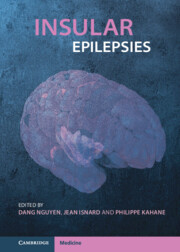Book contents
- Insular Epilepsies
- Insular Epilepsies
- Copyright page
- Contents
- Contributors
- Foreword
- Chapter 1 A Brief History of Insular Cortex Epilepsy
- Section 1 The Human Insula from an Epileptological Standpoint
- Section 2 The Spectrum of Epilepsies Involving the Insula
- Section 3 Noninvasive Investigation of Insular Epilepsy
- Chapter 13 Noninvasive Electrophysiological Investigations in Insular Epilepsy
- Chapter 14 Structural Imaging of Insular Epilepsy
- Chapter 15 PET and SPECT in Insular Epilepsy
- Chapter 16 Neuropsychology of Insular Epilepsy
- Section 4 Invasive Investigation of Insular Epilepsy
- Section 5 Surgical Management of Insular Epilepsy
- Index
- References
Chapter 16 - Neuropsychology of Insular Epilepsy
from Section 3 - Noninvasive Investigation of Insular Epilepsy
Published online by Cambridge University Press: 09 June 2022
- Insular Epilepsies
- Insular Epilepsies
- Copyright page
- Contents
- Contributors
- Foreword
- Chapter 1 A Brief History of Insular Cortex Epilepsy
- Section 1 The Human Insula from an Epileptological Standpoint
- Section 2 The Spectrum of Epilepsies Involving the Insula
- Section 3 Noninvasive Investigation of Insular Epilepsy
- Chapter 13 Noninvasive Electrophysiological Investigations in Insular Epilepsy
- Chapter 14 Structural Imaging of Insular Epilepsy
- Chapter 15 PET and SPECT in Insular Epilepsy
- Chapter 16 Neuropsychology of Insular Epilepsy
- Section 4 Invasive Investigation of Insular Epilepsy
- Section 5 Surgical Management of Insular Epilepsy
- Index
- References
Summary
Epilepsy surgery patients played a pioneering role in our early understanding of the insula in Penfield’s stimulation studies. Following the advent of functional imaging, epilepsy patients are once again helping us understand the role of this critical structure in human behavior. The insular cortex is involved in a wide range of complex human functions, including auditory processing, language function, attention, emotional processing, social cognition, and decision-making. In this chapter, we review this literature and report new data on the postoperative neuropsychological function of a series of 31 patients who have undergone partial or complete insular resections at the Centre Hospitalier de l’Université de Montréal (CHUM). Standard neuropsychological assessments reveal few cognitive impairments specific to insular epilepsy or its surgery. Specialized assessments are required to fully assess the impact of insular resection on socio-emotional processing and behavioral features of executive function that can be compromised following surgery.
- Type
- Chapter
- Information
- Insular Epilepsies , pp. 194 - 202Publisher: Cambridge University PressPrint publication year: 2022



